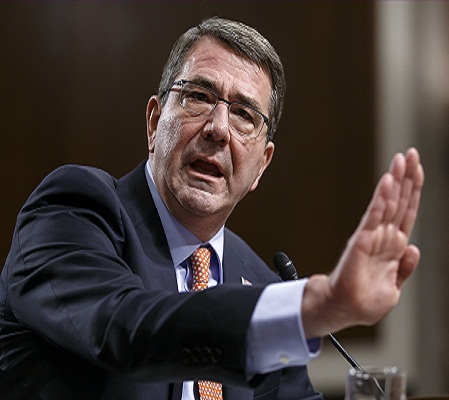Two days ago US Defense Secretary Ashton Carter made remarks that were meant to agitate Arab states against Iran.
"If
you look at where the Iranians are able to wield influence, they are in
the game, on the ground,” Carter said, referring to Iranian military
activities in Syria, Iraq, Lebanon, and Yemen. "We don’t like it that
they’re in the game on the ground, but they are in the game. There is a
sense that some of the Gulf states are up there at 30,000 feet,” more
interested in acquiring advanced fighter jets than in building—and
deploying—special-operations forces.

Carter went on, "It is apparent to us, and we are trying to make it apparent to the Gulf states, and some of them understand this—the United Arab Emirates is one that understands—that the reason they lack influence, and feel they lack influence in circumstances like Iraq and Syria, with [ISIS], is that they have weighted having high-end air-force fighter jets and so forth over the hard business of training and disciplining ground forces and special-operations forces.”
Carter’s remark met severe response from Iran, however.
The commander of Iran’s Joint Staff of Armed Forces has lashed out at U.S. Defense Secretary Ashton Carter for his recent remarks about Iran, saying Carter has gone too far.
"America and the allies of the White House enjoy killing Muslims. The Takfiri terrorists in Afghanistan, Pakistan, Iraq, Syria, Yemen, Lebanon, and the north of Africa have not satiated their desire. That is why they want to set Muslims at loggerheads,” Hassan Firouzabadi said on November 8.
Iran has no conflict with any neighboring country, but rather has diplomatic relations with all of them, he stressed.
Firouzabadi’s remarks followed recent statements by Carter who had tried to agitate Arab countries to engage in on-ground activities in restive countries such as Syria and Iraq.
Carter had claimed that Iran keeps on-ground presence in those countries, calling on Arab states to train and deploy special forces to the areas.
Also the same day, Iranian Defense Minister Hossein Dehqan called on U.S. Defense Secretary Ashton Carter to talk more cautiously and not agitate reginal states.
The U.S. defense secretary would better stop making arrogant statements and start talk more cautiously to prevent his country from getting involved in problems such as Somalia, Afghanistan, Iraq, and Yemen, Dehqn stated.
He said Carter would better stop agitating regional Arab countries toward engagement in war.
The Iranian defense minister asserted that Iran considers the U.S. as the main cause of current troubles in the region.
"The movement of resistance against the domineering system, headed by the U.S., is still alive and grows more powerful every day,” Dehqan stated.
"Iran seeks regional peace and stability and has paid for it so far,” he said, adding, "We consider the region’s security to lie in the lack of presence and interference of the U.S. and ultra-reginal powers.”
At a summit meeting at Camp David in May with the member states of the GCC—Saudi Arabia, the United Arab Emirates, Qatar, Kuwait, Bahrain, and Oman—President Barack Obama publicly promised these countries "ironclad” American support, but at the same time privately chided them for their passivity and told them he was under no pressure from the Middle East-weary American people to become further entangled in their regional disputes. A consistent complaint of the Obama administration is that numerous American allies in the greater Middle East, including, notably, Turkey, as well as the Gulf states, expect the United States to do the hardest fighting against their regional enemies—enemies who pose far more immediate threats to their interests than they do to American national security.
He went on, "I’ve said the same things to them: ‘Guys, you come and complain to us but you’re not in the game. You have to get in the game. This stuff that you want”—advanced aircraft, mainly—"doesn’t do you any good when the Houthis are overrunning Yemen.’” Carter said that the U.A.E., which recently lost 45 troops in a single day in Yemen, is a country more fully committed to fighting on its own behalf. "The Emiratis have a small but capable force, but the other Gulf states, Egypt, and so forth, they don’t. Egypt still has a very large conventionally oriented, war-with-Israel military, which is odd, given the kaleidoscope of problems they have around them.”
Western and Arab states have long been accusing Iran of carrying out on-ground movements in Syria, Iraq, and Yemen. Tehran, however, has always denied the accusations. Iran says it is providing the rightful Syrian Army of President Bashar al Assad with military consultation, but keeping off the battle ground.
This is while all other countries from the United States to Saudi Arabia and other Arab countries to Russia have carried out airstrikes in the troubled countries. So far Iran looks like the wisest and most humane.
The Arab and Western powers have also accused Iran of baking the Houthi– also known as Ansarullah – group, which are a Shiite minority in Yemen.
But Iran has denied those accusations. In the case of Yemen as well as Iraq and Syria, Iran has always called for a political solution and warned of the bad sides of military action.
Iran blames the West for terrorist movements in the region, saying it is witnessed by the fact that so far thousands of people have joined the Islamic State in Iraq and the Levant (ISIL) and other terrorist and Takfiri groups.
Iran says it has marked a margin of 40 kilometers from its borders. If the ISIL or other terrorist groups trespass that limit, then they will be crushed by Iranian forces, Tehran has maintained.
Iran says the threat better be fought sooner than later, when it might have practically afflicted the whole world.